If you’re looking for the best essential oils for bedwetting, you’ve come to the right place.
If you know me, and you know Nifty Wellness, you know essential oils are our favorite thing. They can help or solve just about anything, and bedwetting is no exception.
Whether for an adult, or a child, essential oils can work wonders. But, which ones are the best?
Well, before we go into the nitty-gritty of it, here’s a brief overview of the absolute best essential oils for bedwetting.
| The Essential Oil | My Favorite One |
| Cypress | Amazon |
| Lavender | Amazon |
| Juniper | Amazon |
| Clary Sage | Amazon |
| Lemongrass | Amazon |
Are Essential Oils Good for Bedwetting?

In general, occasional bedwetting is nothing to be too concerned about. But if you are interested in natural, at-home remedies for treating bedwetting, essential oils are well worth the try!
The natural plant-based extracts of essential oils and their aromatic effects have been known to prevent, treat, and cure a wide variety of ailments—even bedwetting.
Parents have praised the aromatherapy of Cypress and other essential oils as a natural remedy for bedwetting.
Especially if your child’s bedwetting is not a symptom of a larger health issue, essential oils can be fantastic natural agents to treat and relieve nighttime incontinence.
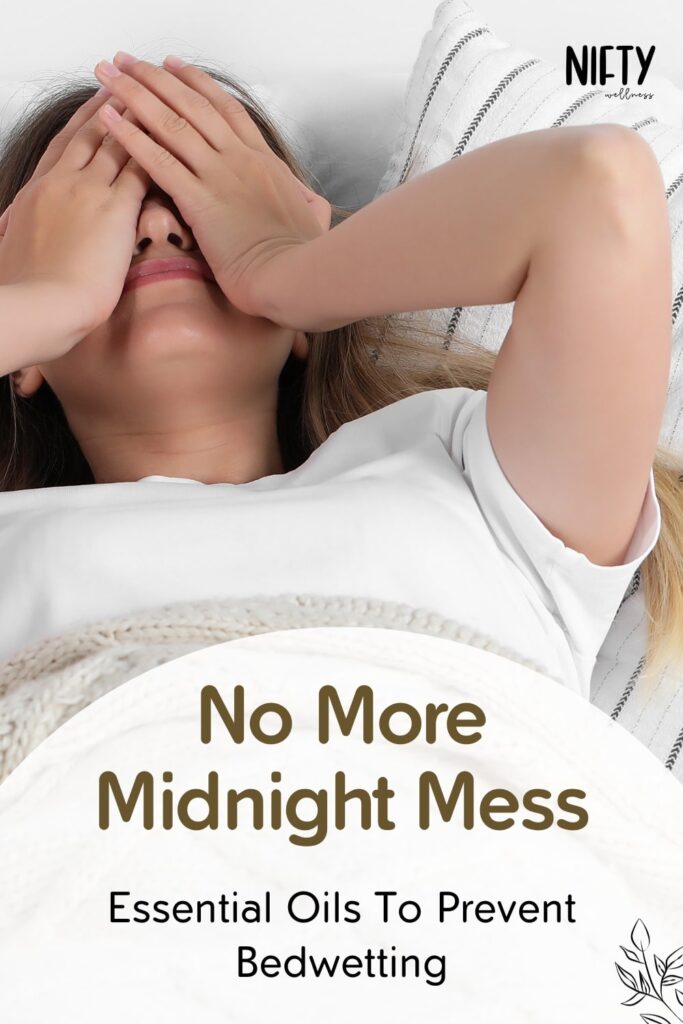
Cypress Essential Oil For Bedwetting

When it comes to essential oils for bedwetting, Cypress is by far the most beloved oil. It is known to calm excessive fluid retention, treat bedwetting, and do wonders for other bladder issues.
Cypress can calm an overactive bladder and relieve the frequent urge of having to urinate. This essential oil is astringent and antispasmodic; whose constricting properties help tighten the skin and tissue within the bladder region.
How to Use: The most effective way to use Cypress oil is to dilute several drops into a soothing and emollient carrier like grapeseed oil, jojoba oil, or shea butter. Massage the mixture onto the abdomen before bedtime.
Some people may experience sensitivity or skin reactions when using Cypress oil topically. Thus, it is best to test a small area of the skin and monitor that reaction before using it frequently.
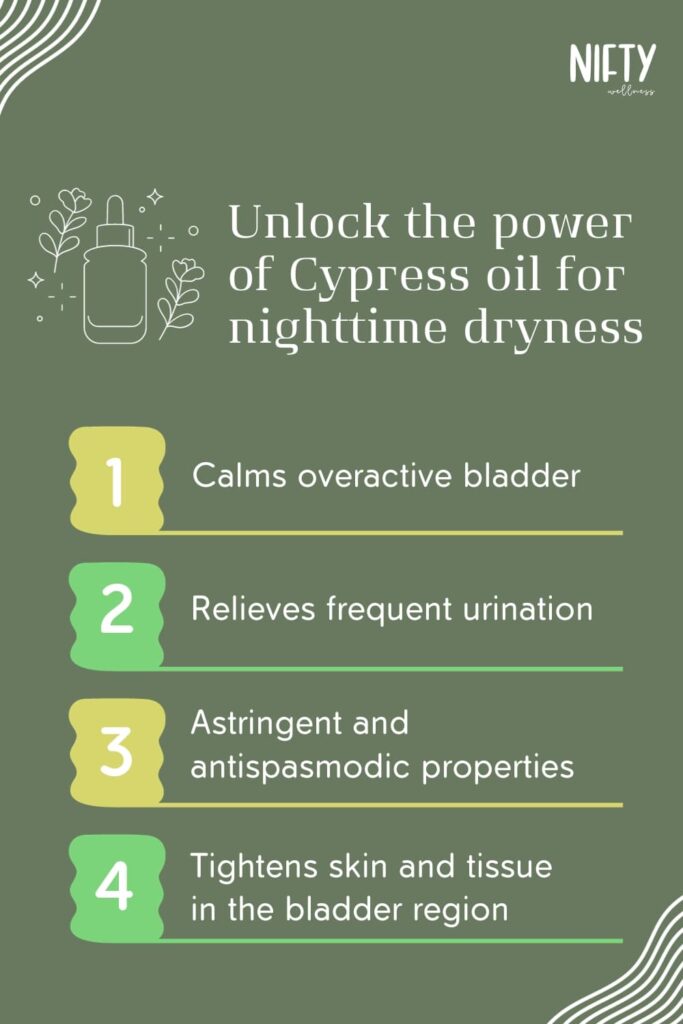
Struggling with low porosity hair? Check out our new blog Oils for Low Porosity Hair: Essential Oils, Carrier Oils & Secrets to Healthy and Vibrant Hair. Embrace the beauty of healthier hair.
Other Essential Oils For Bedwetting

Cypress essential oil can be blended with other oils to help relax the bladder and stop one from wetting the bed. In addition to topical application, these oils can also be diffused at night to calm the mind and body.
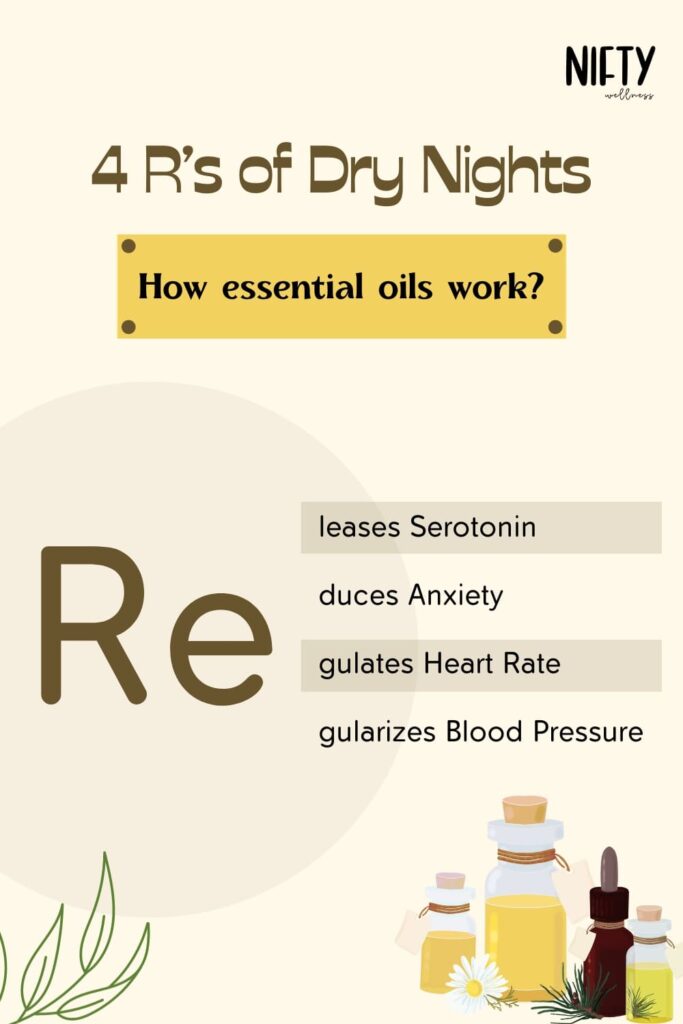
Lavender Essential Oil
Besides Cypress, lavender is a critically vital oil for calming and soothing the bladder.
It has also been shown useful in treating nocturia, the condition in which you wake one or more times during the night because you have to urinate.
How to Use: Add a few drops of lavender essential oil to a diffuser in the bedroom before bedtime to create a calming and soothing atmosphere. You can also dilute it with a carrier oil and apply a small amount to the soles of the feet for added relaxation.
Juniper Berry Essential Oil
Juniper berry is a brilliant oil that helps support the bladder and urinary system and has been shown to help treat UTIs, as well as kidney and bladder stones. Its calming scent also helps young ones fall asleep.
How to Use: Dilute juniper berry essential oil with a carrier oil and massage it gently onto the lower abdomen and lower back area before bedtime. This can help support the urinary system and reduce the chances of bedwetting.
Clary Sage Essential Oil
Like lavender, clary sage can calm and ease stress in the mind and body. Because of this, it is a potent oil for treating overactive bladder and other urinary problems.
How to Use: Mix a few drops of clary sage essential oil with a carrier oil and apply it to the lower abdomen and pelvic area. Clary sage is known for its hormone-balancing properties, which can help address bedwetting issues.
Lemongrass Essential Oil
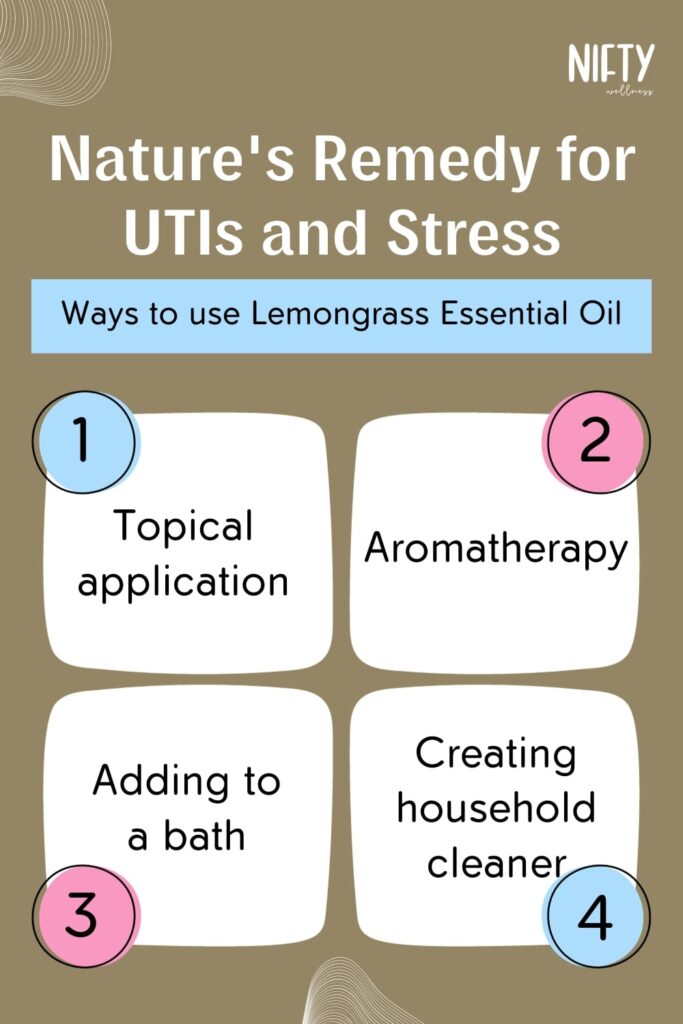
Lemongrass essential oil is commonly used to prevent and treat urinary tract infections because it is highly effective in neutralizing infection-causing bacteria such as S. aureus and B. cereus.
The scent of lemongrass oil can also ease the mind and body, reducing stress and worry.
How to Use: Add a few drops of lemongrass essential oil to a warm bath before bedtime. The soothing aroma can help relax the mind and body, potentially reducing the occurrence of bedwetting.
Read our latest blog “The Ultimate Guide To Oils For After Shaving: Achieve a Smooth and Nourished Skin” to know about the oils that have been thoughtfully selected to deliver unmatched hydration and care for post shave.
What Is Bedwetting?


Bedwetting also referred to as nocturnal enuresis or nighttime incontinence, is involuntary urination during sleep.
To some extent, bedwetting can be expected of young children, but it becomes less common as they age. Nocturnal enuresis typically occurs in children over the age of seven or after the age at which staying dry at night is expected.
Nocturnal enuresis is common, affecting more than five million children each year in the U.S., and is slightly more common for boys than girls. There are two types of nocturnal enuresis.
Primary Nocturnal Enuresis
Primary nocturnal enuresis is the term to describe children who have not achieved any dry nights since potty-training.
Secondary Nocturnal Enuresis
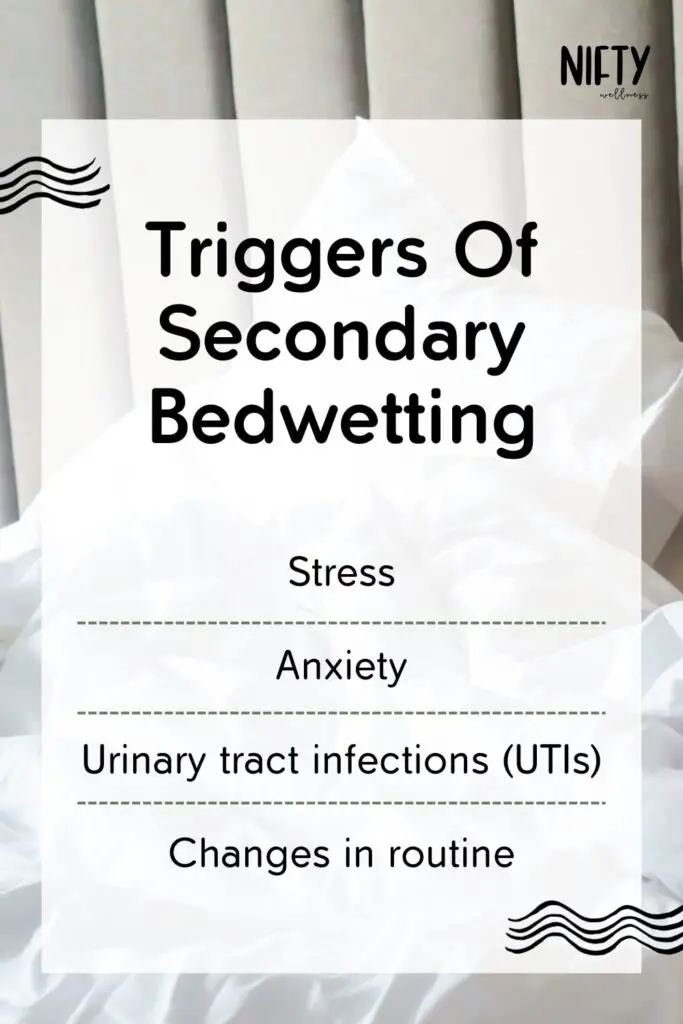
Secondary nocturnal enuresis describes those children who achieved consistent dry nights for at least six months in a row but have now started wetting the bed.
While most children outgrow wetting the bed on their own, as it is often an embarrassing and uncomfortable experience, individual accounts of bedwetting could be a sign of an underlying condition.
If your child is still wetting the bed after the age of seven or if bedwetting is accompanied by unusual thirst, painful urination, snoring, hard stool, or pinkish-red urine, consult your child’s doctor.
Conclusion
In summary, essential oils are an effective alternative to address the problem of bedwetting. It is a promising approach to addressing the issue in children and adults alike. The power of nature in these essential oils can provide a sense of calm and tranquillity, potentially reducing nighttime incontinence episodes. When used thoughtfully and safely, these oils contribute to creating a serene bedtime routine.
Bedwetting, or nocturnal enuresis, is a common concern, particularly among children. While it often resolves naturally, persistent bedwetting can be distressing. Essential oils, with their soothing and relaxing properties, have the potential to support a peaceful night’s sleep. However, it is essential to remember the potency of these oils.
Ensure the oils are properly diluted and compatible with the skin before use. Making an informed decision is crucial when incorporating essential oils into your routine. It should align with your preferences and health considerations while offering a gentle and comforting option to help you or your loved ones enjoy restful nights.
Frequently Asked Questions

What Causes Bedwetting?
Bedwetting can be triggered by several causes, including:
- Sleep apnea.
- Stress.
- Anxiety.
- Small bladder.
- Inability to recognize a full bladder.
- Urinary tract infection.
- Certain diuretic foods or drinks.
- Drinking too much liquid before bed.
How Can I Stop Bedwetting Naturally?
Besides using essential oils such as Cypress, you can reduce the likelihood of bedwetting by:
- Limiting fluids in the evening.
- Avoiding caffeinated foods and beverages (for children at all times but especially before bed).
- Regularly going to the bathroom throughout the day.
What Does Cypress Essential Oil Blend Well With?
Cypress essential oil blends gorgeously with citrusy scents such as lemon, lime, orange, and bergamot.
It can also be paired with clary sage, frankincense, lavender, marjoram, lemongrass, sandalwood, rosemary, and juniper berry essential oils.
What Is Cypress Essential Oil Commonly Used For?
In addition to its uses as a treatment for bedwetting, Cypress oil can also promote circulation and relieve muscle pain and cramps.
It is also well known for its aromatherapy benefits which include reducing stress and anxiety.
Can You Apply Cypress Oil Directly to Skin?
Though Cypress essential oil is generally safe and non-toxic, and many parents have successfully used it directly on the skin, it is safer to dilute this and other essential oils with a carrier oil before topical use.
